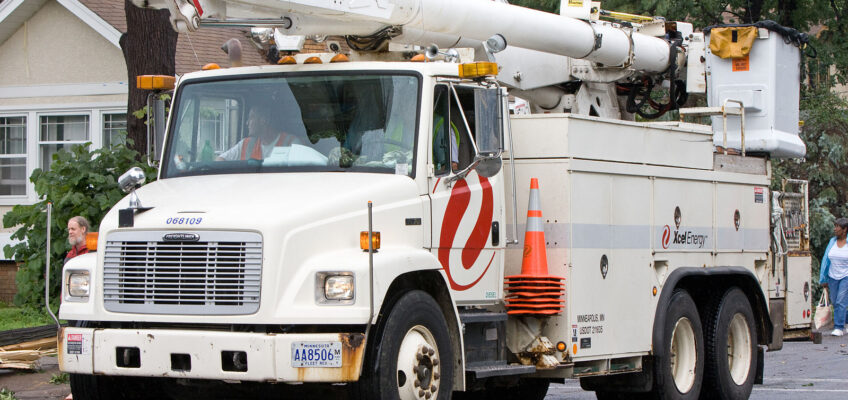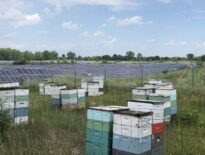July 27, 2020 (MINNEAPOLIS, MINN) — A report card released today by clean energy advocates gave Xcel Energy high marks for retiring existing coal plants, low marks for equity, and a failing grade for their proposal to build a large gas plant in Central Minnesota. The report card graded Xcel’s Integrated Resources Plan (IRP), which—if approved by Minnesota’s Public Utilities Commission—will guide the company’s energy investments for the next 15 years. The clean energy advocates said the report card is meant to simplify the complexities of the IRP for the public and help Xcel customers to provide input on the plan through public comments and public hearings held by the Public Utilities Commission in October.
The report card is premised on the idea that Minnesotans deserve reliable, affordable power from the cleanest possible sources. Advocates created the report card by evaluating Xcel’s draft 15-year plan, filed in July, on seven subjects of particular interest to the clean energy community. Subjects that Xcel is being graded on include:
- Equitable access to all of clean energy’s benefits: D+
- A path to 100% renewable energy: B+
- Retiring coal plants: A
- Avoiding additional fracked gas infrastructure: F
- Supporting energy independence for consumers: D
- Support for communities and workers: B-
- A plan for transportation electrification: B+
The full text of the report card is available here. A website where Minnesotans can weigh in on the plan is here.
Here’s what advocates who released the report card are saying about Xcel Energy’s resource plan:
“Minnesota’s energy mix is at a critical tipping point. To protect ratepayers, support low-income communities and safeguard clean air Xcel must choose clean energy now,” said John Delurey, Midwest Director at Vote Solar. “Xcel’s energy blueprint makes significant progress toward Minnesota’s vision for a clean energy future, but falls short of ensuring an equitable transition. In their final proposal we hope to see a strong commitment to all Xcel customers.”
“Xcel’s plans to reduce carbon emissions by phasing out coal are hamstrung by their proposal to build a billion dollar gas plant and pipeline that would both exacerbate the climate crisis and inflate utility bills. The plan is further weakened by Xcel’s decision to ignore the rapidly growing community solar and rooftop solar markets, and line investor pockets instead” said Patty O’Keefe, Organizing Representative with the Sierra Club’s Beyond Coal Campaign. “In the wake of George Floyd’s murder and increased calls to confront systemic racism, Xcel must be doing everything in its power to ease energy burdens in low-income communities and communities of color by investing in 100% clean energy that builds wealth in all communities, lowering financing barriers to energy efficiency, and diversifying their workforce. This resource plan has a long way to go to address these urgent needs for Minnesotans.”
“This plan––despite being one of the most climate progressive of any shareholder-owned utility––runs the risk of spending millions to build new or extend old power plants for power customers will provide for themselves,” said John Farrell, co-director of the Institute for Local Self-Reliance.
“Until our energy future is explicitly by and for the benefit of Minnesotans and all the places and people our energy depends on, our future will be something like what you see in this Report Card: green-washed and profit-driven,” said Alice Madden, organizer at Community Power. “ This is not personal – there is an abundance of good intentions and good people at Xcel. Rather it is systemic – Xcel’s incentives as a corporation in a monopoly energy system focus undeniably on centralizing ownership, big centralized power stations (whether clean or dirty), and centralized decision-making within their walls. The casualties where Xcel’s current incentives are king? Community ownership, localized climate resilience, affordability, indigenous self-determination, energy efficiency, and meeting climate goals at their urgent deadlines. Locally specific, community-based climate solutions must be at the forefront, not under Xcel’s foot.”
“While Xcel Energy makes significant strides in energy efficiency, renewable energy, and grid management tools, this plan is far from the level of transformative change needed to create a carbon-free energy system that benefits local communities, workers, and Xcel customers,” said Meghan Hassett, Midwest Campaign Coordinator with the Union of Concerned Scientists. “I am particularly disappointed with Xcel’s failure to model an energy future that doesn’t include the Becker gas plant. This lack of imagination sticks consumers with energy that is more polluting and less cost-effective than alternatives.”
“There’s a lot of hand-wringing from Big Oil and its friends about the impossibility of ending the fossil fuel era,” said MN350 Communications Director Brett Benson. “The truth is, we know what to do. We have to electrify everything, we have to take carbon out of electricity production, and we have to make those changes in an equitable way. It defies common sense to consider expanding the use of fossil gas in the middle of the climate crisis. And even with its reputation as a leading utility, Xcel clearly has not done enough to ensure that our inevitable transition to a clean-energy economy is done in an equitable way. Xcel’s low marks are its report card are well-deserved.”
“As political will for bold climate action grows, people at the grassroots are eager to organize for climate solutions like beneficial electrification of heating that would help end our dependence on fossil fuels,” said Chelsea DeArmond, founder of Saint Paul 350. “However Xcel Energy’s proposal to build at least one new fracked gas power plant and pipeline would lock carbon into our electrical grid for decades to come. Building new gas power plants at a time when fracking bans are on the rise and prices are increasingly volatile puts ratepayers on the hook for more stranded assets when gas plants (like the coal plants before them) are forced to retire early due to economic and environmental hazards. We’re pleased to see more utility-scale wind and solar in the plan, and we urge Xcel to continue demonstrating leadership among investor-owned utilities by pairing these local, renewable resources with battery storage instead of fracked gas piped in from out of state.”
###
Photo via Wikimedia Commons.






